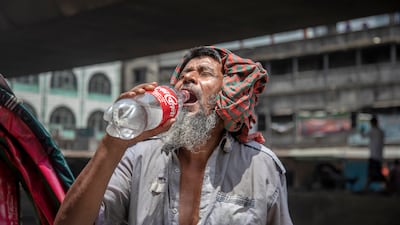An increasing threat of climate change could heavily affect public health and access to education across Bangladesh, the chief of an aid agency has said.
Asif Saleh, the executive director of Brac, an international development organisation in Bangladesh, said that schools and universities were closed this week because of a heatwave likely caused by climate change.
The South Asian country of 174.3 million people is the seventh most climate-vulnerable country, with about half of the population living and working in areas at high risk of climate change.
“We have seen the worst heatwaves in the country – it’s almost 42°C. It’s higher in Bangladesh than it is in Abu Dhabi, and that is something we have never seen before,” he told The National on Tuesday at the Asian Venture Philanthropy Network Global Conference in Abu Dhabi.
“Schools have been closed for the last few days. It means loss of productivity, loss of produce in the farms and it is a huge source of disaster of many different types.”
Brac has been operating schools in the country since 1987, with more than 15 million children having graduated.
“We have found a number of models, which are very low cost and scalable, for schools by creating one-room schools to support dropout children from state schools,” said Mr Saleh.
Potential public health crisis
Mr Saleh said that climate change is linked to public health and contributes to a shortage of drinking water.
The rising seawater levels result in salinity which affects drinking water. About 26 million people in the country are exposed to high salinity in shallow groundwater. Salinity intrusion into drinking water can create risks of hypertension and pre-eclampsia, skin diseases, acute respiratory infection, diarrheal diseases and transmission of mosquito-borne diseases.
“People are drinking salt with water, resulting in other kinds of public diseases,” said Mr Saleh.
“We are now trying to come up with different models for water because we are doing a lot of rainwater harvesting at scale, both at the household and community level and also through entrepreneurs for livelihood work,” he said.
“We are doing a lot of research in salinity tolerant seeds for different crops.
“In those barren lands, we have produced a massive amount of sunflowers, which do very well.”
Climate refugees
Climate change also leads to the displacement of people, with about 13 million people projected to be climate refugees by 2050.
“I think when displacement happens, you're not necessarily going to be just internal,” said Mr Saleh.
“People are going to cross over the borders, for example, when desperation comes in, they try to take risks.
“If we cannot stop it, it's going to create a big regional sort of destabilisation and in a way, there’s going to be political chaos and there will be a lack of social cohesion.”
Locally led climate adaptations
Brac is hopeful that more climate adaptation initiatives should be carried out by local entities, rather than international ones.
“One of the critical things that we find challenging is that we feel that climate adaptation should be locally led,” said Mr Saleh.
“And money needs to go to the local organisations as well because it's cost-effective and it's highly impactful.
“But right now, the money is mostly stuck in intermediary organisations, which are not getting channelled to local organisations.”


